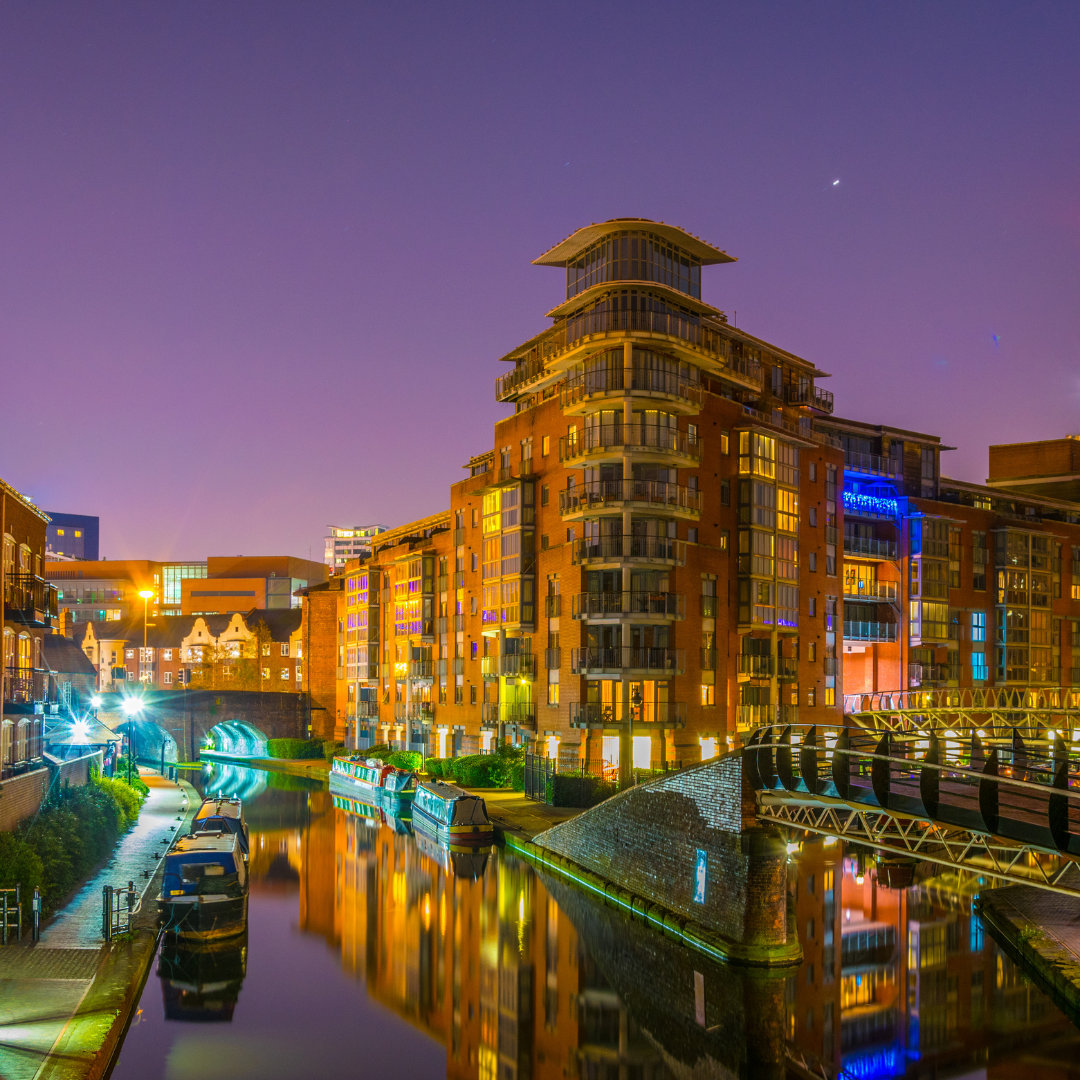Birmingham Property Investment
The UK’s second largest city, Birmingham, carries the alias of the ‘Midlands Engine’. With a population over 1.1 million, an exceptional economy, future growth plans, and a high number of private renters, it’s no wonder it has become increasingly popular spot for property investors.
Read on to learn more about Birmingham, including analysis of past and future market performance, a run-down of the best areas, and an overview of what makes the city so special.
FILL IN YOUR CONTACT DETAILS AND ONE OF OUR TEAM WILL BE IN TOUCH
Find Your Next Property In Birmingham
Table of Contents
Birmingham: A Summary

Birmingham’s property market has shown promising growth over the past decade, making it an attractive destination for property investors.
The city’s property prices have grown significantly, outperforming the UK average and even cities like London in certain aspects. For instance, between 2010 and 2023, Birmingham’s property prices grew by 77.58%, compared to the UK’s average growth of 69.77%.
Furthermore, the potential for capital appreciation is high, with predictions indicating a rise of 19.2% in property prices from 2023 to 2027.
This growth is supported by economic and infrastructure developments, such as HS2 and the West Midlands Metro expansion, which are expected to bolster the local economy and property market.
As a property investment company, Birmingham regularly features in our consultations with clients. The city has offered brilliant returns for investors so far, and it is expected to continue doing so well into the future.
Property Investment Opportunities
Off Plan Property in Birmingham
One of the key opportunities for savvy investors in Birmingham is the burgeoning market for off-plan properties. Developers, eager to minimise financial risks, often offer significant discounts to those willing to purchase properties before construction is complete.
This allows investors to secure exceptional properties well below market rates, and often in some of the city’s most desirable locations – especially as Birmingham’s city centre is experiencing a construction boom, with numerous new residential developments springing up across the skyline.
This is driven by the city’s ongoing regeneration projects, such as the highly anticipated Smithfield and Paradise developments, which are set to redefine Birmingham’s urban landscape. By investing off-plan, you not only benefit from lower entry prices but also position yourself to take advantage of the city’s continuing growth and increasing property values.
However, it’s important to note that off-plan investment may not be suitable for everyone. It requires patience and a willingness to wait for the development to complete, often over several years. If this aligns with your investment goals, though, the long-term returns can be substantial.
For a closer look, see our full range of complete and off-plan property in Birmingham below. If something piques your interest, don’t hesitate to reach out to our team for a free investor brochure.
CONTACT THE TEAM
Why Birmingham?
The rental market in Birmingham is particularly strong, driven by a young and professional demographic. Rental prices are projected to increase by 12% over the next five years, the fastest growth rate in the country.
This demand is fueled by the city’s large student population, which contributes to a steady tenant market for buy-to-let property owners.
Additionally, Birmingham’s property market offers more affordability compared to cities like London, with significantly lower average property values.
The diverse range of investment opportunities, both in residential and commercial properties, along with a favourable economic outlook, makes Birmingham an ideal location.

Popular Areas
In 2024, Birmingham presents a variety of attractive areas for property investment, each offering unique benefits for investors. Here’s a summary of some of the most popular areas. For more information, take a look at our research covering the best buy-to-let areas in Birmingham.
City Centre
The heart of the city offers a rental yield of 6.2%. The city centre is a hub of activity and redevelopment, making it a prime spot for investors looking to capitalise on Birmingham’s growth and regeneration initiatives. Naturally, Birmingham’s city centre is popular with professionals who want to live close to their workplaces and other city centre amenities. Leaning on the city’s industrial past, factory conversions and period properties are popular in the centre (in particular, see the Jewellery Quarter), and they’re supplemented by a range of new build blocks. With the population in the city centre at circa 25,800 and growing, along with very strong yields, central Birmingham is still a hot spot for property investors.
Digbeth
Offering a rental yield of 6.6%, Digbeth is rapidly emerging as a trendy and desirable area, especially among young professionals. Its unique blend of independent shops, pubs, and a thriving arts scene, along with the upcoming tram stop, make it increasingly popular. Digbeth has been tipped as an up-and-coming spot for buy-to-let investment in the immediate future due to its affordability, demand, and expected price growth. Prices are still at a relatively low entry point and the area could deliver great returns for those who invest early. Furthermore, Digbeth is subject to more than £2 billion worth of planned development projects over the coming years. It is also within walking distance of HS2’s Curzon Street Train Station, plus the existing Moor Street and New Street stations. This really is one spot to look out for.
Selly Oak
Known for its high rental yield of 9.6%, Selly Oak is a top choice, particularly appealing due to its large student population and vibrant community. It’s an ideal location for investors targeting the student rental market. Selly Oak primarily caters to the student population given its proximity to the University of Birmingham. The area is constantly evolving, with numerous new developments and amenities being added, enhancing its appeal as a lively and convenient location for students and young professionals.
Hockley
With a rental yield of 6.5%, Hockley is another attractive area for investors. It’s known for its cultural diversity and vibrant community, appealing to many tenants. Hockley is also renowned for its rich industrial heritage, particularly in the jewellery and metalworking sectors. This area is transforming, blending its historical roots with modern living, making it an attractive spot for both residential and commercial investments.
Get In Touch
If you have any questions or would like to enquire about our services, please click on the button below to be redirected to our contact page. Our team is dedicated to providing exceptional customer service and we will do our best to assist you with any inquiries you may have.
Types of Property Investment in Birmingham

Buy-To-Let
A low supply of rental properties mixed with increasing demand makes Birmingham buy-to-let properties a wise investment choice. JLL research suggests that rental prices in Birmingham could increase by 12% over the next five years, making it one of the fastest levels of growth in the country.

Student Accommodation
With five, popular universities, Birmingham has a student population of around 80,000, meaning there is a substantial requirement for accommodation. Plus, Knight Frank reports that Birmingham is one of the top UK cities for overseas students, who favour luxury student properties.
Frequently Asked Questions
Below you can find a range of common questions from previous investors. If you require specific details and advice please do not hesitate to contact us today on +44 203 627 3987 or via [email protected].
01. Is Birmingham a good place to invest in property?
02. What price can I expect to pay for a property in Birmingham?
According to Zoopla, the average price paid for a property in the whole of Birmingham over the past 12 months was £248,088. However, the average price for a flat over the past year was £203,356.
03. Have property prices increased in Birmingham?
04. Can I achieve strong rental yields in Birmingham?
Investors can achieve strong rental yields from Birmingham buy-to-let property, especially in the city centre. Properties in the centre often generate yields between 4-5%, with postcodes such as B1, B2 and B3 performing particularly well.
05. Will HS2 be in Birmingham?
Yes, the HS2 train line will be connected with Birmingham’s existing rail routes. Phase one of the HS2 project is set to see Birmingham’s travel time to London cut to just 40 minutes. Furthermore, the city will be within an hour’s commute to Manchester, Sheffield, Leeds, York, Preston and Wigan.
Why Work With Us?
As a property investment company in Birmingham and elsewhere across the UK, we pride ourselves on finding high-potential, well-priced opportunities in a clear, ethical manner for our clients. In addition:
- We do not charge any sourcing fees.
- We’re signed up to the Property Ombudsman Scheme to protect our clients.
- We conduct extensive due diligence on all investment opportunities.
- We provide after-sales support.
- Due to our close relationships with property developers, often we can get exclusive discounts or bonuses (like a free furniture pack)
- We’ll help you with any extra steps in your journey, whether that’s finding a mortgage provider, instructing a property management company, or something else.
News & Articles

Track Capital’s Exclusive Site Visit to Manchester’s Best-Selling Development
Date: October 11, 2024









